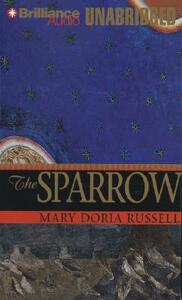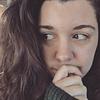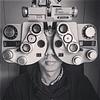Take a photo of a barcode or cover
Jesuits in Space! It's pretty good, and builds suspense very well, but sometimes suffers from "awkard sci-fi dialogue" syndrome. If you have to tell your readers that your characters are laughing, the joke wasn't actually funny.
Science fiction is a little out of my comfort zone, but I did enjoy this book. Russell is a great writer...if you like philosophy, science fiction, aliens, or religous studies, you might like this book.
In 2019, a musical radio signal from a planet is picked up on Earth.
In 2021, the Society of Jesus sends a group of seven to the planet Rakhet.
In 2059, Father Emilio Sandoz returns to Earth. The sole survivor of the mission, he is physically and mentally broken. He is bitter, stubborn and feels betrayed by God. The Society needs to understand what happened on the planet, but he is not ready to share.
Emilio Sandoz was not always the bitter man he has become. Interwoven with the stories present are the flashbacks of Emilio's life before Rakhet and the time spent among the Runa, a beautiful and welcoming race of people living on Rakhet. It is through these flashbacks that we learn of Emilio's quest to find God, and discover the reasons why he is now so hardened towards him.
Though The Sparrow may seem at first glance to be a religious novel, it is not. It is about the journey to find faith in something. From devout priest to atheist, the characters have a wide range of religious beliefs, but they are all looking for answers. The characters were all beautifully crafted, each with their own vivid personality.
An anthropologist by education, Mary Doria Russel's roots certainly show in this novel. The culture she creates on the planet of Rahket is extremely unique and intricate while still remaining believable.
This is definitely going on the favorites shelf, and I look forward to reading the next book in the series!
In 2021, the Society of Jesus sends a group of seven to the planet Rakhet.
In 2059, Father Emilio Sandoz returns to Earth. The sole survivor of the mission, he is physically and mentally broken. He is bitter, stubborn and feels betrayed by God. The Society needs to understand what happened on the planet, but he is not ready to share.
Emilio Sandoz was not always the bitter man he has become. Interwoven with the stories present are the flashbacks of Emilio's life before Rakhet and the time spent among the Runa, a beautiful and welcoming race of people living on Rakhet. It is through these flashbacks that we learn of Emilio's quest to find God, and discover the reasons why he is now so hardened towards him.
Though The Sparrow may seem at first glance to be a religious novel, it is not. It is about the journey to find faith in something. From devout priest to atheist, the characters have a wide range of religious beliefs, but they are all looking for answers. The characters were all beautifully crafted, each with their own vivid personality.
An anthropologist by education, Mary Doria Russel's roots certainly show in this novel. The culture she creates on the planet of Rahket is extremely unique and intricate while still remaining believable.
This is definitely going on the favorites shelf, and I look forward to reading the next book in the series!
adventurous
challenging
dark
emotional
mysterious
tense
medium-paced
Plot or Character Driven:
A mix
Strong character development:
Yes
Loveable characters:
Yes
Diverse cast of characters:
No
Flaws of characters a main focus:
Yes
Graphic: Sexual harassment
This book was soooo good. The BookTube reviews focused on the wrong points, in my opinion. My favorite thing about this book was the characters. Almost any person in this book is someone that I would relish knowing in real life. They feel incredibly real. They are often funny (not funny ha-ha, funny like the older people in your family who speak their mind no matter what), they have tempers, they sometimes take offense, they are so smart, and they are brave. The fellowship between them is strong.
I also so appreciated the prose. This is definitely a book for adults. This is a sci-fi first contact novel, and the sci-fi is well done. Yes, it delivers on the world building, though we still have plenty of mysteries. But what the reader truly takes away is something much more personal. Highly recommend! It does get dark in some parts, so prepare yourself.
I also so appreciated the prose. This is definitely a book for adults. This is a sci-fi first contact novel, and the sci-fi is well done. Yes, it delivers on the world building, though we still have plenty of mysteries. But what the reader truly takes away is something much more personal. Highly recommend! It does get dark in some parts, so prepare yourself.
A good read. Don't feel compelled to continue the story line, but I found it interesting enough.
adventurous
dark
mysterious
slow-paced
While I could tell this book was marvelously written, with lots of complexity, in both the characters and the plot. Tons of truths about humanity and ethics. Layers of meaning. It just wasn’t for me.
A group of Jesuits, in the grand missionary tradition of Jesuits, are off on a space mission. They land on a planet and become entrenched in the local caste system of beings, causing all sorts of issues with their words and actions. Only one man returns to earth, and his interrogations by the local authorities tell the second half of the tale.
I have never loved alien stories, and my own bias prevented me from appreciating this one. If that’s your thing, though, go ahead and check it out.
A group of Jesuits, in the grand missionary tradition of Jesuits, are off on a space mission. They land on a planet and become entrenched in the local caste system of beings, causing all sorts of issues with their words and actions. Only one man returns to earth, and his interrogations by the local authorities tell the second half of the tale.
I have never loved alien stories, and my own bias prevented me from appreciating this one. If that’s your thing, though, go ahead and check it out.
Fabulous combination of sci-fi and theology. Left me wanting me -- fortunately, I discovered the sequel, "Children of God"!
I was introduced to this book through the BookRiot podcast (which has not failed me yet on recommendations); all I knew before I started it was that it was about "Jesuits in space." But it is so much more than that. Mary Doria Russell has expertly used the genre of science fiction -- often maligned by "serious readers" -- to explore the issue of faith in the face of despair and violence. The book pulls you in with the mystery of what happened on Rakhat but leaves you considering much deeper matters, including judgment vs. forgiveness of others and ourselves.
And one final note: surprisingly, this book had more to offer in my work with sexual assault survivors than many therapeutic books I've read. It's that good.
And one final note: surprisingly, this book had more to offer in my work with sexual assault survivors than many therapeutic books I've read. It's that good.
The scientists are idiots, and here are the reasons why:
1. They went in search of an alien civilisation by — literally — flying in the general direction of Alpha Centauri. They figured out the exact location along the way.
2. They arrived at the alien planet, THEN attempted to figure out where to land their spacecraft. Imagine if NASA had done that for the moon landing in the 1960s.
3. They tested the edibility of alien vegetation and wildlife by EATING said alien vegetation and wildlife.
4. When someone died from the alien diet, our scientists couldn't quite figure out why.
5. They weren't able to return to their spaceship in orbit because someone literally used up the fuel in the lander just to show off to the leader of the team.
6. They didn't have a clue what to do upon meeting the aliens for the very first time. No SOPs, nothing.
7. They emerged out of the lander for the very first time, on an alien planet, without spacesuits.
8. They disregarded the possibility of contaminating the aliens with pathogens.
9. They disregarded the possibility of being INFECTED by alien pathogens.
10. They spent six weeks on an alien planet before one of them said, hey, maybe we should start planting our own food — YOU THINK?
11. They plant human food on an alien planet and disregarded the possibility of destroying the local ecosystem.
12. They had no way to maintain radio contact with Earth, and shrugged it off because "everyone they loved was on the planet with them".
Most of the characters end up dead by the hands of the locals. This is not a spoiler.
They deserved to die, anyway. God damn idiots, all of them.
These 'scientists' are the dumbest characters in all of science fiction literature.
1. They went in search of an alien civilisation by — literally — flying in the general direction of Alpha Centauri. They figured out the exact location along the way.
2. They arrived at the alien planet, THEN attempted to figure out where to land their spacecraft. Imagine if NASA had done that for the moon landing in the 1960s.
3. They tested the edibility of alien vegetation and wildlife by EATING said alien vegetation and wildlife.
4. When someone died from the alien diet, our scientists couldn't quite figure out why.
5. They weren't able to return to their spaceship in orbit because someone literally used up the fuel in the lander just to show off to the leader of the team.
6. They didn't have a clue what to do upon meeting the aliens for the very first time. No SOPs, nothing.
7. They emerged out of the lander for the very first time, on an alien planet, without spacesuits.
8. They disregarded the possibility of contaminating the aliens with pathogens.
9. They disregarded the possibility of being INFECTED by alien pathogens.
10. They spent six weeks on an alien planet before one of them said, hey, maybe we should start planting our own food — YOU THINK?
11. They plant human food on an alien planet and disregarded the possibility of destroying the local ecosystem.
12. They had no way to maintain radio contact with Earth, and shrugged it off because "everyone they loved was on the planet with them".
Most of the characters end up dead by the hands of the locals. This is not a spoiler.
They deserved to die, anyway. God damn idiots, all of them.
These 'scientists' are the dumbest characters in all of science fiction literature.





